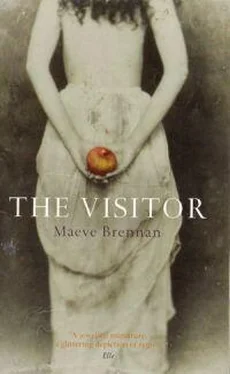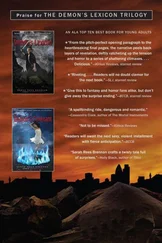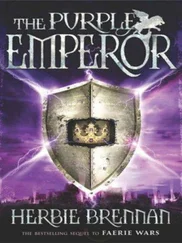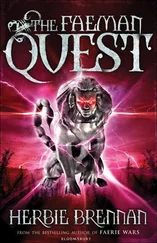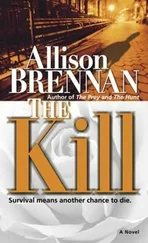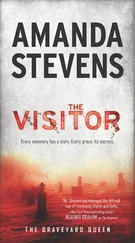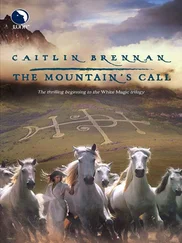Maeve Brennan - The Visitor
Здесь есть возможность читать онлайн «Maeve Brennan - The Visitor» весь текст электронной книги совершенно бесплатно (целиком полную версию без сокращений). В некоторых случаях можно слушать аудио, скачать через торрент в формате fb2 и присутствует краткое содержание. Жанр: Проза, на английском языке. Описание произведения, (предисловие) а так же отзывы посетителей доступны на портале библиотеки ЛибКат.
- Название:The Visitor
- Автор:
- Жанр:
- Год:неизвестен
- ISBN:нет данных
- Рейтинг книги:5 / 5. Голосов: 1
-
Избранное:Добавить в избранное
- Отзывы:
-
Ваша оценка:
- 100
- 1
- 2
- 3
- 4
- 5
The Visitor: краткое содержание, описание и аннотация
Предлагаем к чтению аннотацию, описание, краткое содержание или предисловие (зависит от того, что написал сам автор книги «The Visitor»). Если вы не нашли необходимую информацию о книге — напишите в комментариях, мы постараемся отыскать её.
The Visitor — читать онлайн бесплатно полную книгу (весь текст) целиком
Ниже представлен текст книги, разбитый по страницам. Система сохранения места последней прочитанной страницы, позволяет с удобством читать онлайн бесплатно книгу «The Visitor», без необходимости каждый раз заново искать на чём Вы остановились. Поставьте закладку, и сможете в любой момент перейти на страницу, на которой закончили чтение.
Интервал:
Закладка:
Now then, the square was as busy as ever it was. There were strollers around and in the park, and a noisy knot of errand boys arguing among themselves on the corner. She turned away from them all with a wispy, frightened smile and took her purse and her hat and her gloves and put them down on the path in front of her, and took off her high-heeled shoes and put them with the pile, and leaning awkwardly against the lamp post, pulled off her stockings and tucked them carefully into her shoes.
She stepped back barefooted into the street with her eyes turned expectantly up to the open window. Full of derision and fright, watching where their faces would appear she stared up and began to sing, sudden and loud as one in a dream, who without warning finds a voice in some public place:
“There is a happy land
Far far away
Where we have eggs and ham
Three times a day
Oh it’s a happy land
Yes it is. ”
She was sure of all the words. It was a song she had learned by heart one time, at school. The rowdy errand boys became instantly silent, and so did all the place around, and a passing motorist came to a halt, for a look.
Then there were the two faces, both of them at the window, looking out at her and waving as though they were the ones sailing away, while she called up to them. “Goodbye, Grandmother. Goodbye, Katherine. You see, I haven’t gone yet. ”
Editor’s note
Saul Bellow once said that most writers come howling into the world, blind and bare. A few, a handful in every generation, arrive with nails, hair, and teeth, and with eyes that see everything. They speak clearly and coherently, and immediately take up fork and knife at the grownups’ table.
The late Maeve Brennan was one of the few. A native Dubliner and a longtime member of the staff of The New Yorker , she published her first short story in 1950, when she was thirty-four. “The Holy Terror” was not an apprentice piece; it was the early work of a mature writer, one already in full command of her style and signature subject matter. It tells the story of Mary Ramsay, the ladies’ room lady in the Royal Hotel in Dublin, who for thirty years kept a tireless, sour vigil from “a shabby, low-seated bamboo chair set in beside a screen in the corner of the outer room.” “She was all eyes and ears.” “She took a merciless pleasure in watching women as they passed before her in their most female and desperate and comical predicaments.” “Her dislike of these women possessed her completely.” “She bore in her heart a long, directionless grudge, a ravenous grudge.”
Mary Ramsay, or rather the spirit that animates her, recurs in a number of Maeve’s other stories. It is there in Mary Lambert, who in “A Young Girl Can Spoil Her Chances” attempts to “talk sense” to her daughter’s suitor, to discourage him from marrying the foolish child who has so often embarrassed her and who now enrages her with the prospect of leaving home. It is there too in Min Bagot, who in “The Springs of Affection” takes revenge on her beautiful, despised sister-in-law by surviving her and appropriating her many fine things.
And it is there in Mrs King, the grandmother in The Visitor . This novella, recently discovered in a university archive and published here for the first time, is the earliest of all of Maeve’s known writings. It is also the most representative. It is the ideal place for one to begin with her work, for not only does it show where she set out from but it also explores so much of her later fictional world in small compass. The completeness of vision of The Visitor , and the ease with which the novella takes its place among her finest stories, is astonishing. This ferocious tale of love longed for, of love perverted and denied, is one of her finest achievements.
Mrs King is an embodiment of one side of the Irish temperament, the selfish, emotionally unreachable side. She takes great satisfaction in bringing pain to those who would come between her and her happiness, and her happiness lies in the total possession of her son. There is little natural affection in her, and even less compassion. Her motive force is contempt, especially for those who think her capable of softheartedness.
Mrs King smiles, but only in anger. Her granddaughter, Anastasia, craves nothing so much from her as a smile of kindness, of approval. This troubled young woman is another of Maeve’s archetypes. There is something of her in Delia Bagot, a woman who features in so many of Maeve’s best stories, another unloved soul whose neediness drives her toward madness, another motherless daughter who sometimes sees ghosts. There is even more of her in the long-winded lady, the “I” of Maeve’s first-person sketches for The New Yorker ’s Talk of the Town. The long-winded lady is the Flying Dutchman of Manhattan, an exile from a lovingly remembered past, doomed to roam the city with no real home of her own. She is a sad, self-conscious, but exquisite observer, a traveler in residence, a visitor to this life.
In the music of Maeve Brennan, three notes repeatedly sound together — a ravenous grudge, a ravenous nostalgia, and a ravenous need for love. In The Visitor she plays this chord for the first time, announcing the key of all the songs to follow.
It is not known exactly when Maeve began to write The Visitor , but she completed it sometime in the middle 1940s, when she was living at 5 East Tenth Street, in her adopted Manhattan. If the year is uncertain, the address is not — it is penciled on the cover sheet to the original, an eighty-page, double-spaced, fair-copy typescript.
This typescript — the only extant copy of the work — is now in the Archives of the University of Notre Dame. It came to the library in 1982 as part of its purchase of the business files of Sheed & Ward, the premier Catholic publisher of its day. Maisie Ward, a guiding spirit of the firm, was a well-known figure in the Irish life of mid-century Manhattan, a life that welcomed Maeve upon her coming to the city in 1940. Both women were daughters of illustrious Irishmen — Maisie’s father, Wilfrid Ward, was editor of the Dublin Review ; Maeve’s father, Robert Brennan, was the first Irish ambassador to the United States — and it seems that their paths crossed more than once. Maeve probably sent Maisie Ward The Visitor , perhaps for possible publication, more likely for general literary advice. All of this is conjecture; exactly how it came to Sheed & Ward is unknown and, according to everyone who knew Maeve, will probably remain so. She was modest, even secretive, about her literary business, and she seldom saved a letter.
I have edited all four of Maeve Brennan’s posthumous books. While the others drew on previously published material, most of it from The New Yorker , this book marks the first time I’ve worked on her prose in typescript. I approached it not as a textual scholar but as a trade book editor; that means I cut a repetition here, identified a speaker there, and made a number of small, silent, thrice-considered changes throughout. There were no major cruxes, yet I worried over some of what I did, and still have many questions that I wish I could ask the author, including the very biggest: Why did you never publish this? Was it too short for a first book? Too long for a magazine story? Did you misplace your only carbon of the original? Did you even make a carbon? Or did you just move on, having so many stories yet to tell?
William Maxwell, Maeve’s editor at The New Yorker , told me that she was a shrewd judge of her own prose, never showed him work in progress, and never submitted a story until she could stand by every word of it. I don’t know — maybe no one living knows — her own shrewd judgment on The Visitor . I can only hope that it was kind, and that she would have stood by this, the published version.
Читать дальшеИнтервал:
Закладка:
Похожие книги на «The Visitor»
Представляем Вашему вниманию похожие книги на «The Visitor» списком для выбора. Мы отобрали схожую по названию и смыслу литературу в надежде предоставить читателям больше вариантов отыскать новые, интересные, ещё непрочитанные произведения.
Обсуждение, отзывы о книге «The Visitor» и просто собственные мнения читателей. Оставьте ваши комментарии, напишите, что Вы думаете о произведении, его смысле или главных героях. Укажите что конкретно понравилось, а что нет, и почему Вы так считаете.
